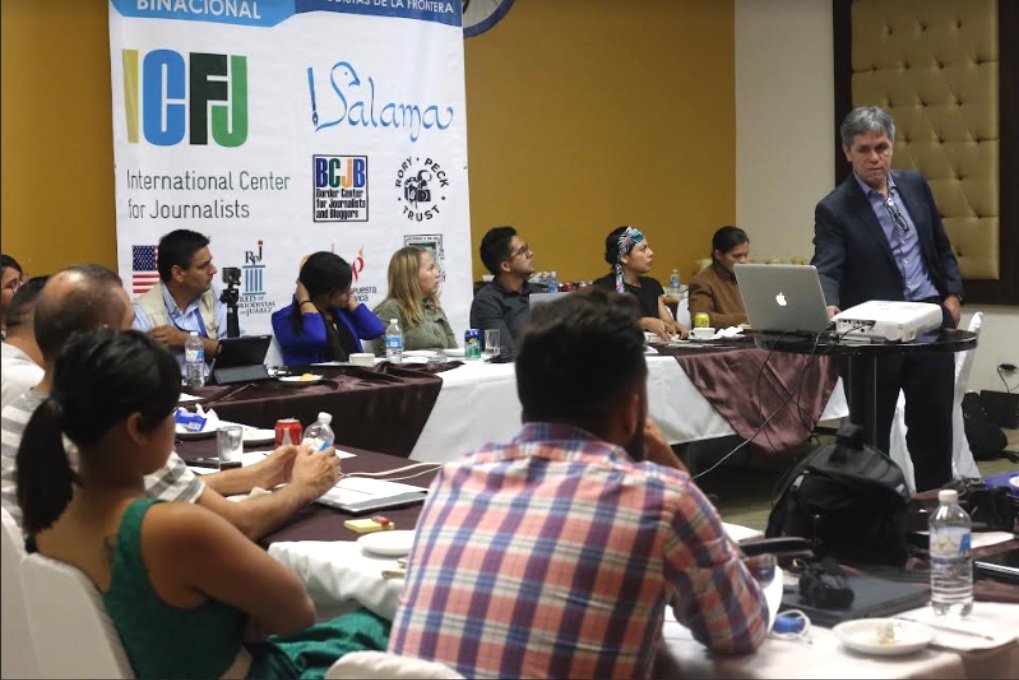BCJB: Getting to Know their Work Improving Journalist Safety on the US-Mexico Border
The Community Series features stories of the people and projects behind the digital rights community.
Jorge Luis Sierra is a seasoned Mexican investigative reporter and editor who, throughout his career, has covered numerous conflict-related topics, including organized crime, corruption, gangs, and the war in Iraq.
The organization he founded, Border Center for Journalists and Bloggers (BCJB), has been defending the rights of journalists working in the Mexican-US border since 2004, while promoting journalism excellence and press freedom.
He notes that they cover news in “one of the most dangerous borders in the world,” which the United Nations has recognized as the world’s deadliest crossing for migrants.
Jorge Luis Sierra trained a group of reporters from Mexico and the USA at the Binational Workshop on Security for Border Journalists in Ciudad Juarez, Chihuahua, on 09/07/2016. Photo: Alicia Fernandez.
How the BCJB Started
In 2004, Jorge Luis Sierra moved from Mexico City to work at a newspaper at the US-Mexican border. There, he noticed that journalists were being targeted and attacked by organized crime when investigating topics like corruption and migration. This was not surprising given the influence and power criminal organizations had in the region, including their control over border and migration routes.
Beyond the dangers journalists faced, Jorge’s research into labor conditions revealed that many of them earned low salaries and lacked security and safety training.
Connecting Mexican and American Journalists Working at the Border
In response, Jorge and his colleagues created BCJB, which has blossomed into a network that connects journalists from Mexico and the US working at the border. To understand the scope of their work: between 2016 to 2017 alone, BCJB provided over 800 journalists with in-person security training and workshops.
During the pandemic, they shifted their focus to virtual courses, but have since resumed in-person training.
Salama: A Tool to Assess and Improve
Journalists' Risks and Safety
One of BCJB’s main projects is Salama, a risk assessment tool which develops the skills and knowledge of journalists and human rights defenders working in high-risk regions.
The tool also has a security library with online tutorials, resources and courses, like the Digital Security Course for Journalists and Human Rights Defenders.
Supporting Journalists at Other Borders, Including Ecuador-Colombia
BCJB is leveraging its expertise to support and train journalists in other borders, such as the Ecuadorian-Colombian one. Collaboration with journalists in this region began in 2018, following the murder of 3 media workers from the newspaper El Comercio (Ecuador). While reporting from and conducting interviews in Ecuador, the journalists were kidnapped by an armed group and then interned in Colombia. The kidnappers attempted to negotiate for their release, but the Colombian and Ecuadorian governments refused to negotiate, and the journalists were ultimately killed.
In response, the Ecuadorian journalists created "Periodistas sin cadenas" (Journalists without Chains, in Spanish) and, among other activities, held a security conference at the San Francisco de Quito University, where Jorge was invited. Since then, BCJB and Ecuadorian media groups have been supporting each other. Notably, a select group of Ecuadorian journalists virtually trained by BCBJ will be going to the US-Mexican border later this year for in-person training.
The Border Center organized a training session for U.S.-based reporters.
In the picture, a reporter takes photos at the Border wall in Hidalgo, Texas, on June 28, 2019. Photo: Jorge Luis Sierra.
The Special Knowledge and Skills Required for Journalists Working at Borders
Journalists who cover border issues require specialized skills and knowledge. They need to understand the political challenges of two or more countries, and also the difficulties migrants face while crossing borders. This is made more difficult by cultural differences that vary from one country to the next
“Journalists covering borders must create and cultivate sources in both countries, while understanding the laws, traditions, ways of doing politics (and challenges), education, security, and employment, among other things, in both countries,” Jorge explains.
On a security level, borders are usually hotspots for the illegal trafficking of goods, drugs and people. This means journalists must develop a strong awareness of security risks and learn how to stay resilient, navigating adversity while continuing their work effectively.
BCJC has provided over 800+ journalists and media workers with in-person security training and workshops.
The Future of Journalism Security and Risks at the Border
Jorge highlights the challenges at the border. He states, “It has become the focal point for international migration and, with it, the crime and violence brought by criminal organizations that control the passage of people”.
Increase of Digital Attacks
He also explains that while physical attacks persist, “we now see digital assaults such as account hacking and electronic surveillance become more frequent, along with legal attacks.”
The BCJB has become a benchmark for good journalism in adverse circumstances. As conditions for journalists have worsened globally, the president of the Center concludes that organizations like BCBJ have “learned to be resilient and follow the path of journalism in complex and difficult circumstances. [We] have diverse knowledge, practices and tools that can be very beneficial for journalists from other parts of the world.”
Stay informed about news and tips from the US-Mexican and other borders by subscribing to the BCJB’s newsletter.
Support their mission by making a donation here.




